Issues and Laws: Protecting the Aged in Australia - [University Name]
VerifiedAdded on 2023/03/31
|7
|1399
|172
Report
AI Summary
This report explores the multifaceted challenges faced by aged people in Australia, encompassing elder abuse, neglect, age discrimination, and homelessness, particularly among older women. It delves into the legal framework designed to protect this vulnerable population, referencing key legislations like the Aged Care Act 1997, the Home and Community Care Act 1985, and the Age Discrimination Act 2004. The report highlights the role of the Australian Human Rights Commission in addressing complaints and advocating for the rights of the aged. It emphasizes the need for stronger legislation, improved government campaigns, and increased social awareness to combat the issues and ensure the well-being of older Australians. The report concludes with a call for more stringent laws and deterrent provisions to protect the aged from abuse, neglect, and discrimination.
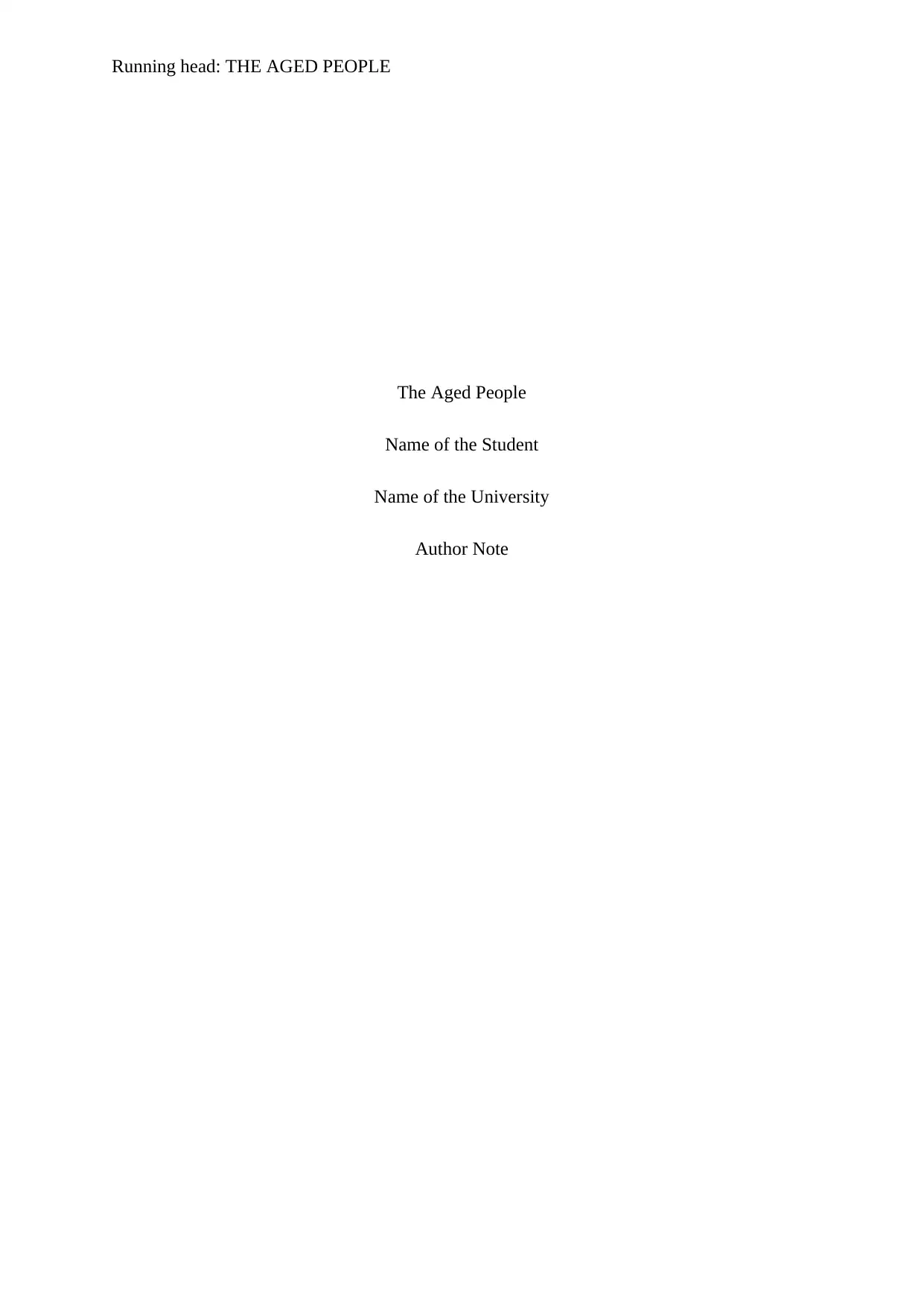
Running head: THE AGED PEOPLE
The Aged People
Name of the Student
Name of the University
Author Note
The Aged People
Name of the Student
Name of the University
Author Note
Paraphrase This Document
Need a fresh take? Get an instant paraphrase of this document with our AI Paraphraser
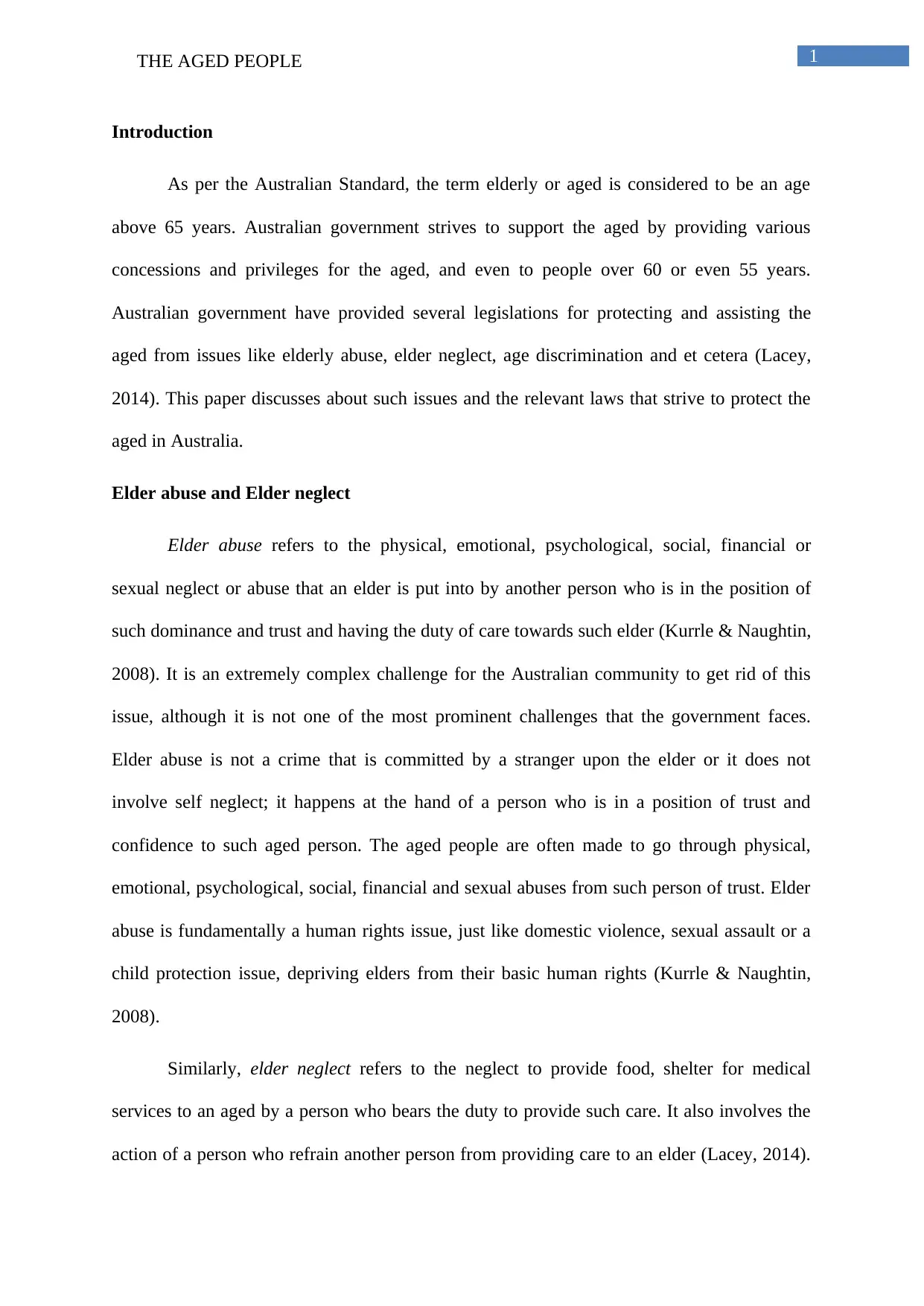
1THE AGED PEOPLE
Introduction
As per the Australian Standard, the term elderly or aged is considered to be an age
above 65 years. Australian government strives to support the aged by providing various
concessions and privileges for the aged, and even to people over 60 or even 55 years.
Australian government have provided several legislations for protecting and assisting the
aged from issues like elderly abuse, elder neglect, age discrimination and et cetera (Lacey,
2014). This paper discusses about such issues and the relevant laws that strive to protect the
aged in Australia.
Elder abuse and Elder neglect
Elder abuse refers to the physical, emotional, psychological, social, financial or
sexual neglect or abuse that an elder is put into by another person who is in the position of
such dominance and trust and having the duty of care towards such elder (Kurrle & Naughtin,
2008). It is an extremely complex challenge for the Australian community to get rid of this
issue, although it is not one of the most prominent challenges that the government faces.
Elder abuse is not a crime that is committed by a stranger upon the elder or it does not
involve self neglect; it happens at the hand of a person who is in a position of trust and
confidence to such aged person. The aged people are often made to go through physical,
emotional, psychological, social, financial and sexual abuses from such person of trust. Elder
abuse is fundamentally a human rights issue, just like domestic violence, sexual assault or a
child protection issue, depriving elders from their basic human rights (Kurrle & Naughtin,
2008).
Similarly, elder neglect refers to the neglect to provide food, shelter for medical
services to an aged by a person who bears the duty to provide such care. It also involves the
action of a person who refrain another person from providing care to an elder (Lacey, 2014).
Introduction
As per the Australian Standard, the term elderly or aged is considered to be an age
above 65 years. Australian government strives to support the aged by providing various
concessions and privileges for the aged, and even to people over 60 or even 55 years.
Australian government have provided several legislations for protecting and assisting the
aged from issues like elderly abuse, elder neglect, age discrimination and et cetera (Lacey,
2014). This paper discusses about such issues and the relevant laws that strive to protect the
aged in Australia.
Elder abuse and Elder neglect
Elder abuse refers to the physical, emotional, psychological, social, financial or
sexual neglect or abuse that an elder is put into by another person who is in the position of
such dominance and trust and having the duty of care towards such elder (Kurrle & Naughtin,
2008). It is an extremely complex challenge for the Australian community to get rid of this
issue, although it is not one of the most prominent challenges that the government faces.
Elder abuse is not a crime that is committed by a stranger upon the elder or it does not
involve self neglect; it happens at the hand of a person who is in a position of trust and
confidence to such aged person. The aged people are often made to go through physical,
emotional, psychological, social, financial and sexual abuses from such person of trust. Elder
abuse is fundamentally a human rights issue, just like domestic violence, sexual assault or a
child protection issue, depriving elders from their basic human rights (Kurrle & Naughtin,
2008).
Similarly, elder neglect refers to the neglect to provide food, shelter for medical
services to an aged by a person who bears the duty to provide such care. It also involves the
action of a person who refrain another person from providing care to an elder (Lacey, 2014).
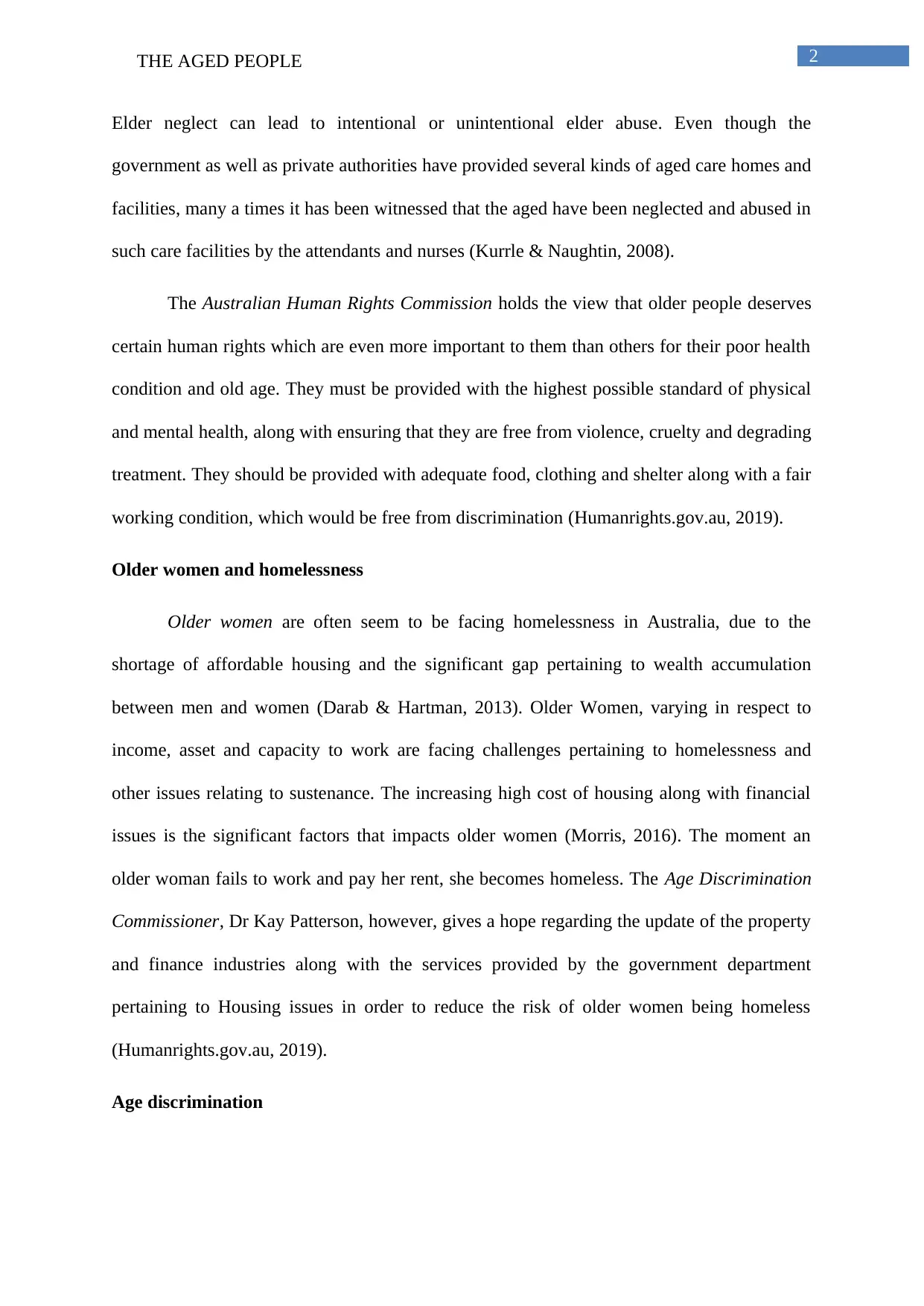
2THE AGED PEOPLE
Elder neglect can lead to intentional or unintentional elder abuse. Even though the
government as well as private authorities have provided several kinds of aged care homes and
facilities, many a times it has been witnessed that the aged have been neglected and abused in
such care facilities by the attendants and nurses (Kurrle & Naughtin, 2008).
The Australian Human Rights Commission holds the view that older people deserves
certain human rights which are even more important to them than others for their poor health
condition and old age. They must be provided with the highest possible standard of physical
and mental health, along with ensuring that they are free from violence, cruelty and degrading
treatment. They should be provided with adequate food, clothing and shelter along with a fair
working condition, which would be free from discrimination (Humanrights.gov.au, 2019).
Older women and homelessness
Older women are often seem to be facing homelessness in Australia, due to the
shortage of affordable housing and the significant gap pertaining to wealth accumulation
between men and women (Darab & Hartman, 2013). Older Women, varying in respect to
income, asset and capacity to work are facing challenges pertaining to homelessness and
other issues relating to sustenance. The increasing high cost of housing along with financial
issues is the significant factors that impacts older women (Morris, 2016). The moment an
older woman fails to work and pay her rent, she becomes homeless. The Age Discrimination
Commissioner, Dr Kay Patterson, however, gives a hope regarding the update of the property
and finance industries along with the services provided by the government department
pertaining to Housing issues in order to reduce the risk of older women being homeless
(Humanrights.gov.au, 2019).
Age discrimination
Elder neglect can lead to intentional or unintentional elder abuse. Even though the
government as well as private authorities have provided several kinds of aged care homes and
facilities, many a times it has been witnessed that the aged have been neglected and abused in
such care facilities by the attendants and nurses (Kurrle & Naughtin, 2008).
The Australian Human Rights Commission holds the view that older people deserves
certain human rights which are even more important to them than others for their poor health
condition and old age. They must be provided with the highest possible standard of physical
and mental health, along with ensuring that they are free from violence, cruelty and degrading
treatment. They should be provided with adequate food, clothing and shelter along with a fair
working condition, which would be free from discrimination (Humanrights.gov.au, 2019).
Older women and homelessness
Older women are often seem to be facing homelessness in Australia, due to the
shortage of affordable housing and the significant gap pertaining to wealth accumulation
between men and women (Darab & Hartman, 2013). Older Women, varying in respect to
income, asset and capacity to work are facing challenges pertaining to homelessness and
other issues relating to sustenance. The increasing high cost of housing along with financial
issues is the significant factors that impacts older women (Morris, 2016). The moment an
older woman fails to work and pay her rent, she becomes homeless. The Age Discrimination
Commissioner, Dr Kay Patterson, however, gives a hope regarding the update of the property
and finance industries along with the services provided by the government department
pertaining to Housing issues in order to reduce the risk of older women being homeless
(Humanrights.gov.au, 2019).
Age discrimination
⊘ This is a preview!⊘
Do you want full access?
Subscribe today to unlock all pages.

Trusted by 1+ million students worldwide
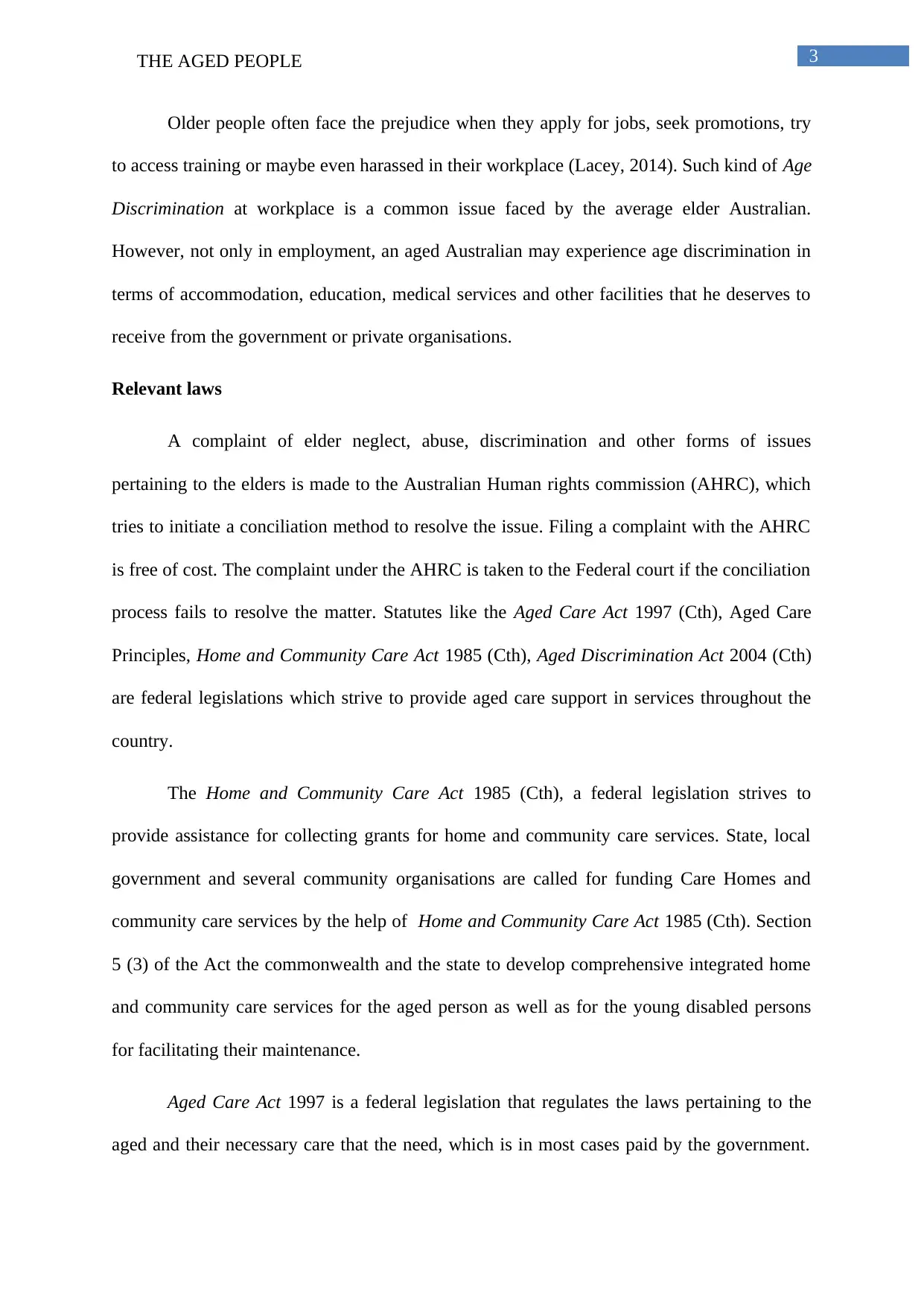
3THE AGED PEOPLE
Older people often face the prejudice when they apply for jobs, seek promotions, try
to access training or maybe even harassed in their workplace (Lacey, 2014). Such kind of Age
Discrimination at workplace is a common issue faced by the average elder Australian.
However, not only in employment, an aged Australian may experience age discrimination in
terms of accommodation, education, medical services and other facilities that he deserves to
receive from the government or private organisations.
Relevant laws
A complaint of elder neglect, abuse, discrimination and other forms of issues
pertaining to the elders is made to the Australian Human rights commission (AHRC), which
tries to initiate a conciliation method to resolve the issue. Filing a complaint with the AHRC
is free of cost. The complaint under the AHRC is taken to the Federal court if the conciliation
process fails to resolve the matter. Statutes like the Aged Care Act 1997 (Cth), Aged Care
Principles, Home and Community Care Act 1985 (Cth), Aged Discrimination Act 2004 (Cth)
are federal legislations which strive to provide aged care support in services throughout the
country.
The Home and Community Care Act 1985 (Cth), a federal legislation strives to
provide assistance for collecting grants for home and community care services. State, local
government and several community organisations are called for funding Care Homes and
community care services by the help of Home and Community Care Act 1985 (Cth). Section
5 (3) of the Act the commonwealth and the state to develop comprehensive integrated home
and community care services for the aged person as well as for the young disabled persons
for facilitating their maintenance.
Aged Care Act 1997 is a federal legislation that regulates the laws pertaining to the
aged and their necessary care that the need, which is in most cases paid by the government.
Older people often face the prejudice when they apply for jobs, seek promotions, try
to access training or maybe even harassed in their workplace (Lacey, 2014). Such kind of Age
Discrimination at workplace is a common issue faced by the average elder Australian.
However, not only in employment, an aged Australian may experience age discrimination in
terms of accommodation, education, medical services and other facilities that he deserves to
receive from the government or private organisations.
Relevant laws
A complaint of elder neglect, abuse, discrimination and other forms of issues
pertaining to the elders is made to the Australian Human rights commission (AHRC), which
tries to initiate a conciliation method to resolve the issue. Filing a complaint with the AHRC
is free of cost. The complaint under the AHRC is taken to the Federal court if the conciliation
process fails to resolve the matter. Statutes like the Aged Care Act 1997 (Cth), Aged Care
Principles, Home and Community Care Act 1985 (Cth), Aged Discrimination Act 2004 (Cth)
are federal legislations which strive to provide aged care support in services throughout the
country.
The Home and Community Care Act 1985 (Cth), a federal legislation strives to
provide assistance for collecting grants for home and community care services. State, local
government and several community organisations are called for funding Care Homes and
community care services by the help of Home and Community Care Act 1985 (Cth). Section
5 (3) of the Act the commonwealth and the state to develop comprehensive integrated home
and community care services for the aged person as well as for the young disabled persons
for facilitating their maintenance.
Aged Care Act 1997 is a federal legislation that regulates the laws pertaining to the
aged and their necessary care that the need, which is in most cases paid by the government.
Paraphrase This Document
Need a fresh take? Get an instant paraphrase of this document with our AI Paraphraser
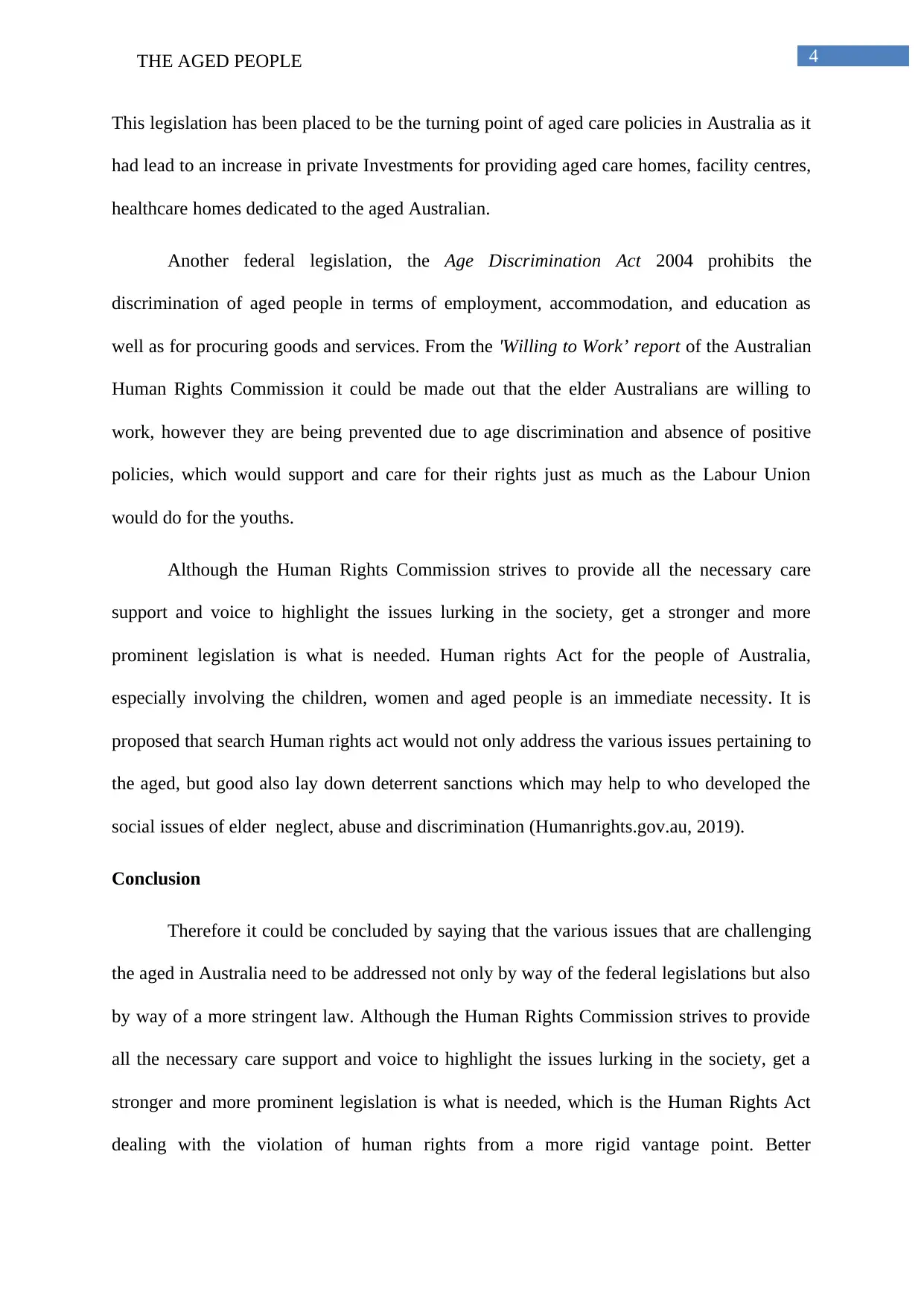
4THE AGED PEOPLE
This legislation has been placed to be the turning point of aged care policies in Australia as it
had lead to an increase in private Investments for providing aged care homes, facility centres,
healthcare homes dedicated to the aged Australian.
Another federal legislation, the Age Discrimination Act 2004 prohibits the
discrimination of aged people in terms of employment, accommodation, and education as
well as for procuring goods and services. From the 'Willing to Work’ report of the Australian
Human Rights Commission it could be made out that the elder Australians are willing to
work, however they are being prevented due to age discrimination and absence of positive
policies, which would support and care for their rights just as much as the Labour Union
would do for the youths.
Although the Human Rights Commission strives to provide all the necessary care
support and voice to highlight the issues lurking in the society, get a stronger and more
prominent legislation is what is needed. Human rights Act for the people of Australia,
especially involving the children, women and aged people is an immediate necessity. It is
proposed that search Human rights act would not only address the various issues pertaining to
the aged, but good also lay down deterrent sanctions which may help to who developed the
social issues of elder neglect, abuse and discrimination (Humanrights.gov.au, 2019).
Conclusion
Therefore it could be concluded by saying that the various issues that are challenging
the aged in Australia need to be addressed not only by way of the federal legislations but also
by way of a more stringent law. Although the Human Rights Commission strives to provide
all the necessary care support and voice to highlight the issues lurking in the society, get a
stronger and more prominent legislation is what is needed, which is the Human Rights Act
dealing with the violation of human rights from a more rigid vantage point. Better
This legislation has been placed to be the turning point of aged care policies in Australia as it
had lead to an increase in private Investments for providing aged care homes, facility centres,
healthcare homes dedicated to the aged Australian.
Another federal legislation, the Age Discrimination Act 2004 prohibits the
discrimination of aged people in terms of employment, accommodation, and education as
well as for procuring goods and services. From the 'Willing to Work’ report of the Australian
Human Rights Commission it could be made out that the elder Australians are willing to
work, however they are being prevented due to age discrimination and absence of positive
policies, which would support and care for their rights just as much as the Labour Union
would do for the youths.
Although the Human Rights Commission strives to provide all the necessary care
support and voice to highlight the issues lurking in the society, get a stronger and more
prominent legislation is what is needed. Human rights Act for the people of Australia,
especially involving the children, women and aged people is an immediate necessity. It is
proposed that search Human rights act would not only address the various issues pertaining to
the aged, but good also lay down deterrent sanctions which may help to who developed the
social issues of elder neglect, abuse and discrimination (Humanrights.gov.au, 2019).
Conclusion
Therefore it could be concluded by saying that the various issues that are challenging
the aged in Australia need to be addressed not only by way of the federal legislations but also
by way of a more stringent law. Although the Human Rights Commission strives to provide
all the necessary care support and voice to highlight the issues lurking in the society, get a
stronger and more prominent legislation is what is needed, which is the Human Rights Act
dealing with the violation of human rights from a more rigid vantage point. Better
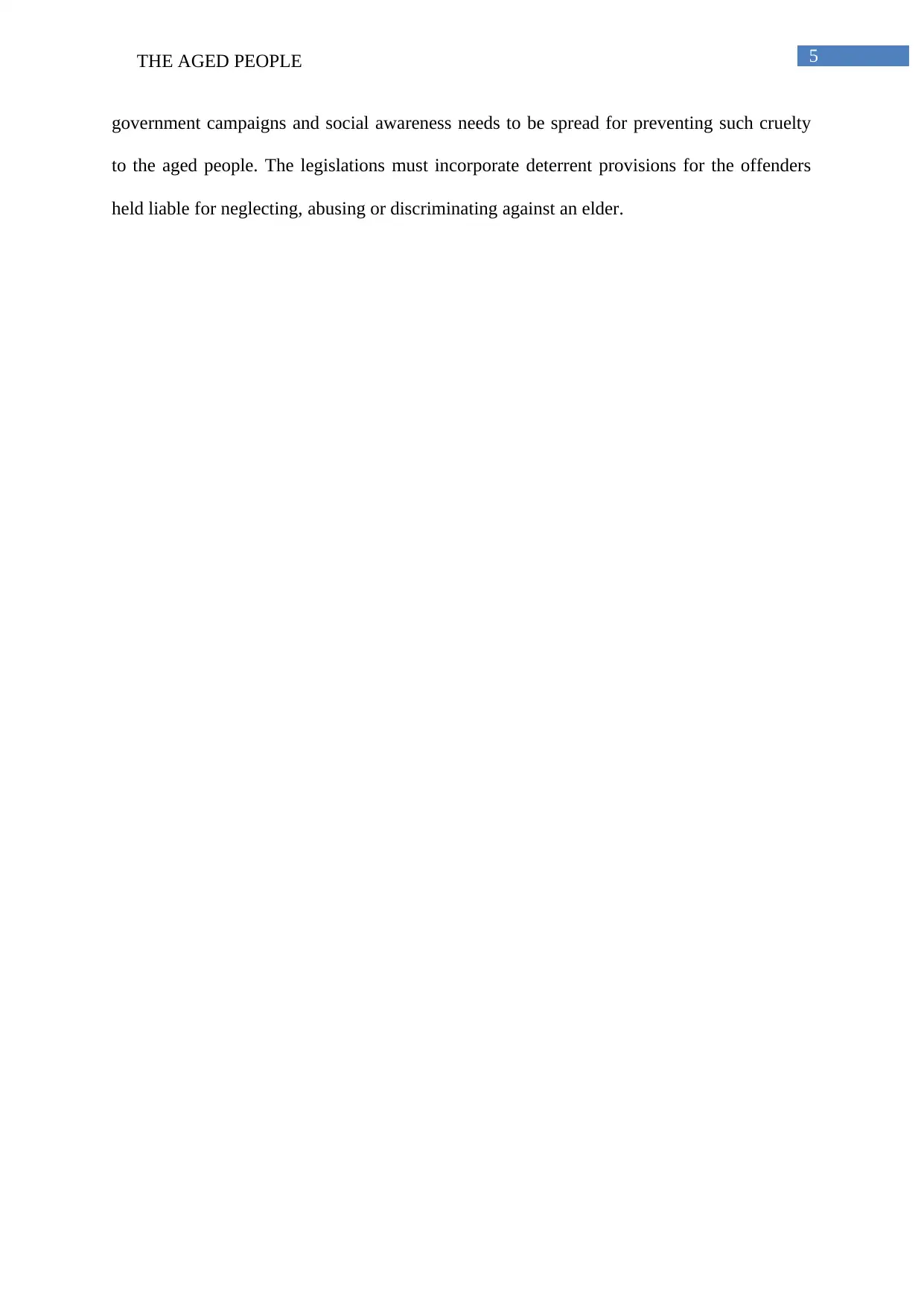
5THE AGED PEOPLE
government campaigns and social awareness needs to be spread for preventing such cruelty
to the aged people. The legislations must incorporate deterrent provisions for the offenders
held liable for neglecting, abusing or discriminating against an elder.
government campaigns and social awareness needs to be spread for preventing such cruelty
to the aged people. The legislations must incorporate deterrent provisions for the offenders
held liable for neglecting, abusing or discriminating against an elder.
⊘ This is a preview!⊘
Do you want full access?
Subscribe today to unlock all pages.

Trusted by 1+ million students worldwide
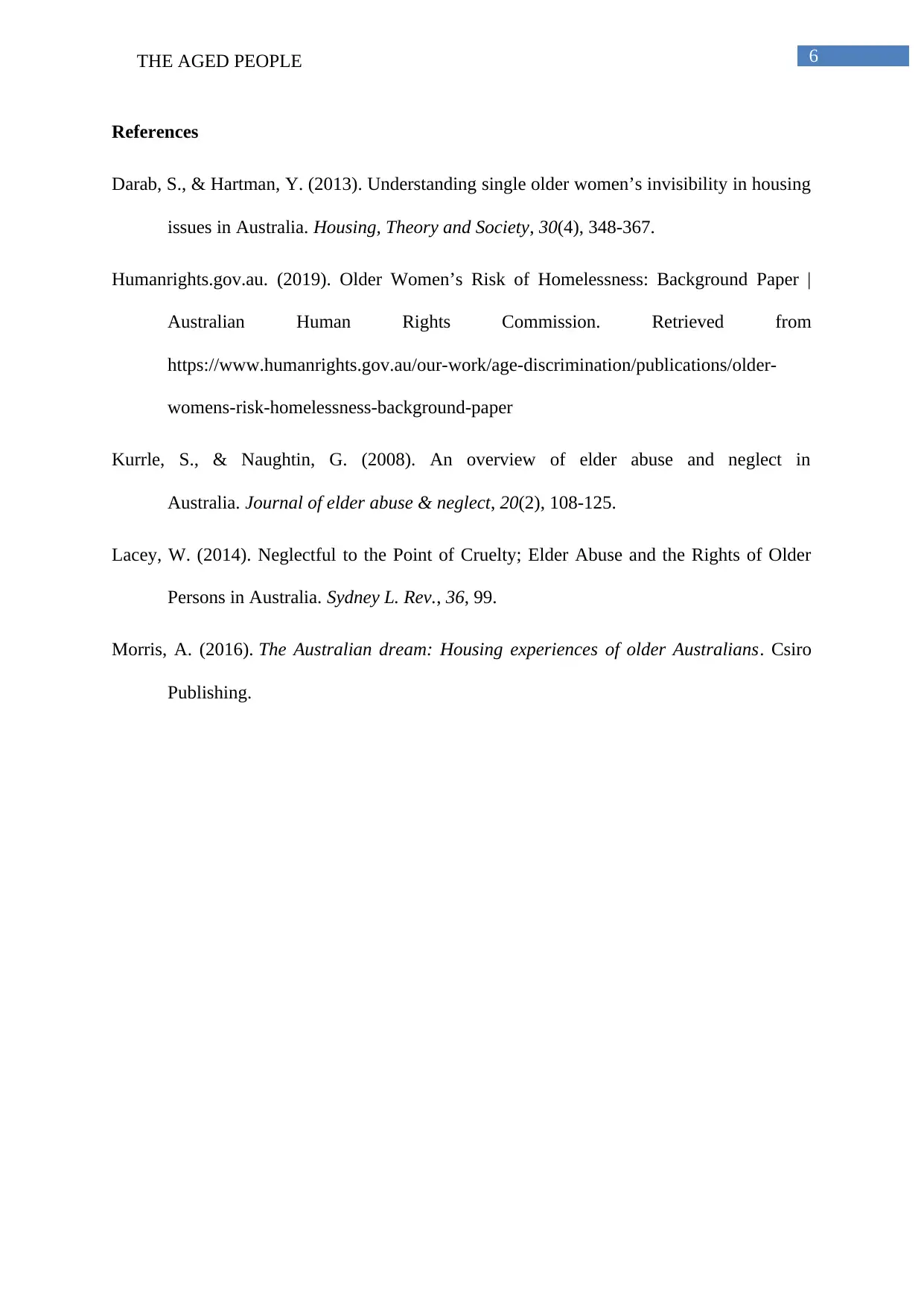
6THE AGED PEOPLE
References
Darab, S., & Hartman, Y. (2013). Understanding single older women’s invisibility in housing
issues in Australia. Housing, Theory and Society, 30(4), 348-367.
Humanrights.gov.au. (2019). Older Women’s Risk of Homelessness: Background Paper |
Australian Human Rights Commission. Retrieved from
https://www.humanrights.gov.au/our-work/age-discrimination/publications/older-
womens-risk-homelessness-background-paper
Kurrle, S., & Naughtin, G. (2008). An overview of elder abuse and neglect in
Australia. Journal of elder abuse & neglect, 20(2), 108-125.
Lacey, W. (2014). Neglectful to the Point of Cruelty; Elder Abuse and the Rights of Older
Persons in Australia. Sydney L. Rev., 36, 99.
Morris, A. (2016). The Australian dream: Housing experiences of older Australians. Csiro
Publishing.
References
Darab, S., & Hartman, Y. (2013). Understanding single older women’s invisibility in housing
issues in Australia. Housing, Theory and Society, 30(4), 348-367.
Humanrights.gov.au. (2019). Older Women’s Risk of Homelessness: Background Paper |
Australian Human Rights Commission. Retrieved from
https://www.humanrights.gov.au/our-work/age-discrimination/publications/older-
womens-risk-homelessness-background-paper
Kurrle, S., & Naughtin, G. (2008). An overview of elder abuse and neglect in
Australia. Journal of elder abuse & neglect, 20(2), 108-125.
Lacey, W. (2014). Neglectful to the Point of Cruelty; Elder Abuse and the Rights of Older
Persons in Australia. Sydney L. Rev., 36, 99.
Morris, A. (2016). The Australian dream: Housing experiences of older Australians. Csiro
Publishing.
1 out of 7
Related Documents
Your All-in-One AI-Powered Toolkit for Academic Success.
+13062052269
info@desklib.com
Available 24*7 on WhatsApp / Email
![[object Object]](/_next/static/media/star-bottom.7253800d.svg)
Unlock your academic potential
Copyright © 2020–2026 A2Z Services. All Rights Reserved. Developed and managed by ZUCOL.





